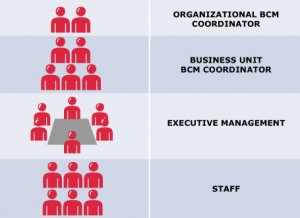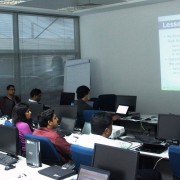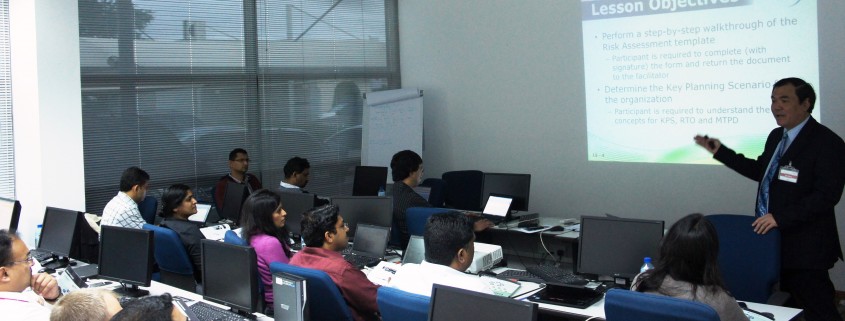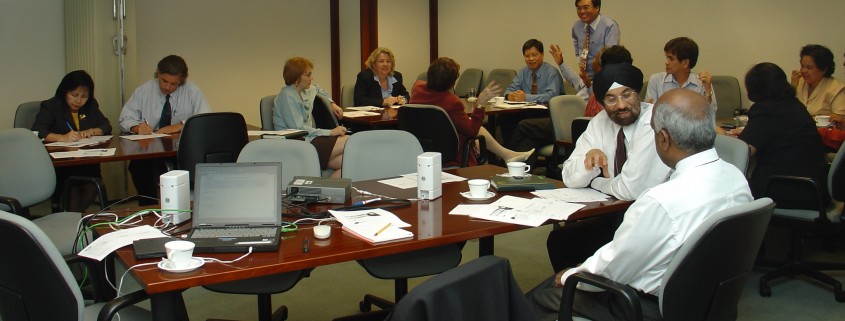In today’s workforce, employee engagement, and opportunities for learning and career growth are key determinants of an organisation’s ability to retain staff. A new generation of workers now expect training to be relevant and tailored towards their job needs leading to ever faster career growth; a one size fits all training model simply will not do.
This expectation of delivering relevant, just-in-time training extends to the area of Business continuity management. Business continuity management, or BCM, is a holistic approach in managing crises and disasters that could disrupt an organisation’s operations and potentially cripple its ability to deliver key products and services. As organisations become increasingly aware of the importance of BCM and organisation resilience, the urgent need to provide qualified BCM training , for employees often falls squarely on the shoulders of the Human Resource (HR) management or Learning and Development (L&D) team. This is particularly problematic since BCM is a specialised area of management and training on proper business continuity planning and execution processes is not usually readily available. Moreover it is difficult for HR or L&D to develop a learning framework that addresses diverse BCM learning requirements at different levels of the organisation. For example, a crisis manager (or some time referred to as the Organization BCM Coordinator) responsible for managing a company-wide crisis would probably need to develop a different toolkit of skills as compared to a Business Unit (BU) CM Coordinator focused on recovering only his or her department in a disaster.

BCM Stakeholders
To address this situation, BCM Institute has developed a comprehensive Learning Roadmap that helps organisations systematically chart its BCM learning journey. This Roadmap emphasises a 3-year learning cycle providing a full suite of BCM training courses for 4 major stakeholder groups. They are,
A full spectrum of training ranging from awareness sessions, half-day management briefings, and specialist training programmes at foundation, intermediate, and advanced levels. If desired, participants could earn for themselves internationally recognised BCM certifications by going through an assessment backed by relevant working experience. In introducing this Learning Roadmap to organisations, BCM Institute works with the responsible HR or L&D departments to customise the roadmap to best fit the organisation.
To enhance the learning journey, all trainings are facilitated by senior and experienced BCM industry practitioners who will share best practices and current trends in BCM, and tips on how to best fulfil various roles in planning and executing BCM for the organisation. Participants who opt to join our public courses can look forward to learning from fellow practitioners from different industries on the challenges faced in implementation and how issues were resolved. All certification-level courses are supplemented with an online revision portal allowing for self learning at their own pace.
To know more about the BCM Institute’s Learning Roadmap, please contact sales.sg@bcm-institute.org or call our office at 6748 1528 to obtain a complimentary whitepaper on Organisational Business Continuity Management Learning Roadmap. Visit us at www.bcm-institute.org to see our full range of BCM, disaster recovery, and crisis management courses.
About the Author

Fistri Abdul Rahim
Fistri has been a sales and marketing professional for 14 years, spending the last 3 years assisting clients from a whole spectrum of industries in upgrading their Business Continuity, Crisis Management and Disaster Recovery competencies. Fistri is responsible for providing solution to the training and development requirement of clients in ASEAN region. Recently, she was also involved in various crisis simulation exercises and infectious diseases business continuity planning. Fistri is a graduate of Murdoch University with a Bachelor’s in Marketing and hold the Business Continuity Certified Planner (BCCP) certification.






